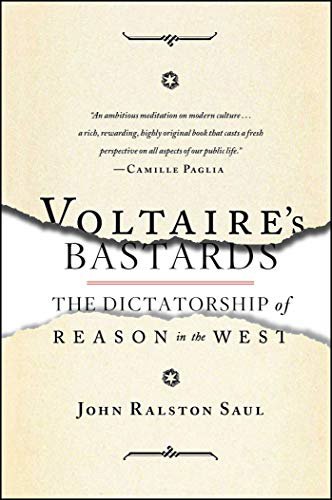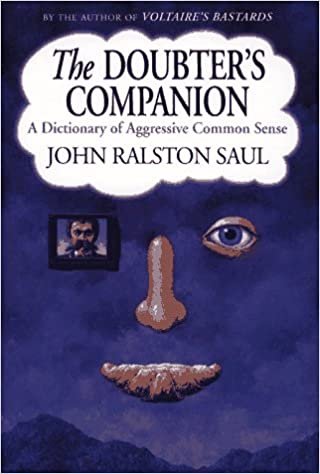John Ralston Saul
John Ralston Saul is an award-winning essayist and novelist. A long-time champion of freedom of expression, he has been president of PEN International since October 2009.
Saul has had a growing impact on political and economic thought in many countries. Declared a “prophet” by TIME magazine, he is included in the prestigious Utne Reader’s list of the world’s 100 leading thinkers and visionaries. His works have been translated into 22 languages in 30 countries.
Saul is perhaps best known for his philosophical trilogy - Voltaire's Bastards: The Dictatorship of Reason in the West, The Doubter's Companion: A Dictionary of Aggressive Common Sense and The Unconscious Civilization. This was followed by a meditation on the trilogy - On Equilibrium: Six Qualities of the New Humanism.
He has received many national and international awards for his writing, including: the Pablo Neruda Medal, South Korea's Manhae Grand Prize for Literature and The Gutenberg Galaxy Award for Literature. The Unconscious Civilization won Canada's Governor General's Literary Award for Non-Fiction, as well as the Gordon Montador Award for Best Canadian Book on Social Issues. His Reflections of a Siamese Twin was chosen by Maclean's magazine as one of the ten best non-fiction books of the twentieth century. His novel, The Paradise Eater, won Italy's Premio Lettarario Internazionale.
He has published six novels, including The Birds of Prey, as well as The Field Trilogy, which deals with the crisis of modern power and its clash with the individual. It includes Baraka or The Lives, Fortunes and Sacred Honor of Anthony Smith, The Next Best Thing, and The Paradise Eater. His most recent work of fiction - the first in over fifteen years - is Dark Diversions, a picaresque novel in which he observes the life of modern nouveaux riches Americans. John lives in Toronto, Canada.
For more information about John Ralston Saul:
Books
Voltaire’s Bastards
With a new introduction by the author, this “erudite and brilliantly readable book” (The Observer, London) astutely dissects the political, economic and social origins of Western civilization to reveal a culture cripplingly enslaved to crude notions of rationality and expertise.
The Western world is full of paradoxes. We talk endlessly of individual freedom, yet we’ve never been under more pressure to conform. Our business leaders describe themselves as capitalists, yet most are corporate employees and financial speculators. We call our governments democracies, yet few of us participate in politics. We complain about invasive government, yet our legal, educational, financial, social, cultural and legislative systems are deteriorating.
All these problems, John Ralston Saul argues, are largely the result of our blind faith in the value of reason. Over the past 400 years, our “rational elites” have turned the modern West into a vast, incomprehensible, directionless machine, run by process-minded experts—“Voltaire’s bastards”—whose cult of scientific management is empty of both sense and morality. Whether in politics, art, business, the military, entertainment, science, finance, academia or journalism, these experts share the same outlook and methods. The result, Saul maintains, is a civilization of immense technological power whose ordinary citizens are increasingly excluded from the decision-making process.
In this wide-ranging anatomy of modern society and its origins—whose “pages explode with insight, style and intellectual rigor” (Camille Paglia, The Washington Post)—Saul presents a shattering critique of the political, economic and cultural establishments of the West.
(Simon & Schuster, July 2013)
Doubter's Companion
A long and distinguished tradition of writers have used the form of a satirical dictionary to undermine the received ideas of their day. Voltaire wrote a sharply humorous "Philosophical Dictionary," while Samuel Johnson's dictionary of the English language was derisive and opinionated. These early dictionaries and encyclopedias were really weapons in a struggle for the soul of civilization between forces of humanistic enlightenment and the forces of orthodoxy and dogmatism. Their authors attacked and exposed the half-truths of their day by showing that it was possible to think differently about the social and political arrangements that everyone took for granted.
But as John Ralston Saul argues in this decidedly unorthodox book, modern dictionaries have once again been captured by the forces of orthodoxy—albeit this time a rationalist orthodoxy. Our language has become as predictable, fragmented, and rhetorical as it was in the 18th century, divided as it is by special interest groups into dialects of expertise that are hermetically sealed off and inaccessible to citizens. In The Doubter's Companion, a marvelous subversive contribution to the great 18th century tradition of the humanist dictionary, Saul skewers and discredits the accepted content of common terms like Advertising, Academics, and Air Conditioning (defined as "an efficient means for spreading disease in enclosed public spaces"); Cannibal, Conservative, and Croissant; Dandruff, Death, and Dictionary ("opinions presented as truth in alphabetical order"); and several hundred others, including Biography ("a respectable form of pornography"), Museum ("safe storage for stolen objects"), and Manners ("people are always splendid when they're dead").
There is much in this volume that will stimulate, offend, provoke, perplex, and entertain. But Saul deploys these tactics of guerilla lexicography to advance the more serious purpose of reclaiming public language from the stultifying dialects of modern expertise.
(Simon & Schuster, January 2002)
Unconscious Civilization
In this intellectual tour de force, Saul argues that the West now toils unconsciously in the grip of a stifling "corporatist" structure that serves the needs of business managers and technocrats as it promotes the segmentation of society into competing interest groups and ethnic blocks.
(Simon & Schuster, May 1999)



